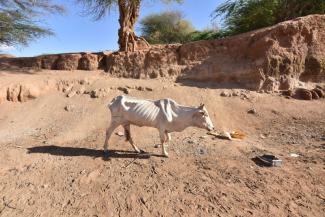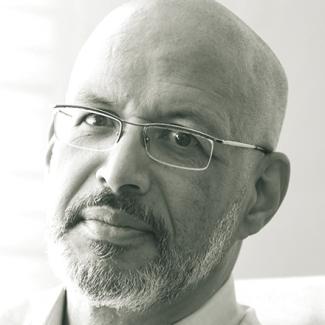Emergency relief
Save human lives

Unfortunately, there have been many hunger catastrophes in the past years. It is also true that decades-long civil wars and bad governance have consequences. Ultimately, it is mostly the weakest in society – children, women and the elderly – who suffer and die.
Some claim that climate change is a political invention, while others recognise it to be a life-threatening reality. In 2015 and 2016, East Africa experienced severe droughts and floods, and at the beginning of 2017, the rainy season failed once more. Rains have always been influenced by the shifts of El Niño and La Niña – but the fluctuations are becoming stronger.
Failing rains mean lack of water and barren fields. Rivers and water sources dry up. Pastoralists (traveling herders) find no fields on which to graze their herd. Animal carcasses line the roads, portending the threat of famine.
In East Africa, pastoralist’s herds generate income and serve as savings. When the animals die, the people lose hope. Hundreds of thousands of people are currently fleeing starvation in East Africa. They are contributing to a regional migration crisis that is hardly being noticed in Europe.
In East and Central Africa, millions are trying to escape drought, hunger, terror and civil war. Poverty and violence are closely interrelated, as conflicts intensify over dwindling resources. People are leaving their villages in Sudan, the Central African Republic, the Democratic Republic of the Congo, Uganda, Somalia, Burundi, Eritrea, Ethiopia, Kenya and – across the Red Sea – Yemen.
Only a few of the refugees find their way to Europe. Most of them stay in the region. Although Ethiopia is not as wealthy as European countries, its borders are open. According to UN data, approximately 900 people are currently arriving in Ethiopia every day and approximately 3,000 are arriving in Uganda every day. In both cases, the refugees are coming from South Sudan.
According to the faith-based ACT Alliance, some 5.6 million people in Ethiopia currently need food aid and 9.1 million people have no access to safe drinking water. While 1.9 million families need assistance for the survival of their animals, 500,000 families depend on receiving new seed.
In Somalia, 6.2 million people – about half of the population – need food aid. Weakened bodies are susceptible to infections, and the World Health Organization (WHO) estimates that more than 5 million Somalis are at acute risk of contracting cholera.
In Kenya, 2.7 million people are currently affected by drought and famine. According to the UN Office for the Coordination of Humanitarian Affairs (OCHA), the situation is most dire in the region bordering Ethiopia and Somalia.
Relief is possible. First and foremost, donations are urgently needed. It is a matter of saving lives. According to OCHA, $ 2 billion are needed in the first half of 2017 for Ethiopia, Kenya and Somalia alone. But the emergency in other countries matters too. Over $ 6.7 billion dollars are needed for a total of 23.4 million East Africans affected by crisis. Only half of this amount has been made available so far.
In the past few years, donations have only reached about one third of this need. As a result, aid organisations have only limited opportunities to provide relief.
Famines develop slowly. Timely action can prevent them. Water and food must be provided. Disease must be prevented. Seed must be stored and distributed appropriately, so fields can be tilled at the right moment. The logistical challenges are huge, but they can be dealt with.
Eradicating hunger by 2030 is one of the UN Sustainable Development Goals. This goal is attainable – but it requires decisive action. An old quote by Franklin D. Roosevelt is as timely as ever: “The test of our progress is not whether we add more to the abundance of those who have much; it is whether we provide enough for those who have too little.”
Christoph Schneider-Yattara is the director of Bread for the World’s regional office for the Horn of Africa based in Addis Ababa. Bread for the World is a Protestant non-governmental organisation and a member of the ACT Alliance.
csyattara@bregional.org











